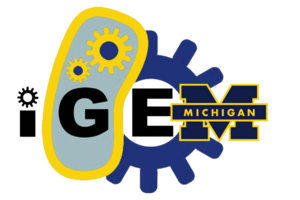Team:Michigan/Human Practices Overview
From 2011.igem.org
(→Human Practices) |
(→Human Practices) |
||
| Line 37: | Line 37: | ||
So what have we done to work on our goals? | So what have we done to work on our goals? | ||
| - | <br | + | |
| + | <br> | ||
1. ''Surveying'' | 1. ''Surveying'' | ||
| Line 48: | Line 49: | ||
Ideally we wanted to make the process as informal as possible without negatively affecting our data. We geared questions in a manner to best predict how different environments affect peoples’ synthetic biology knowledge. | Ideally we wanted to make the process as informal as possible without negatively affecting our data. We geared questions in a manner to best predict how different environments affect peoples’ synthetic biology knowledge. | ||
| - | <br | + | |
| + | <br> | ||
2. ''Board Game'' | 2. ''Board Game'' | ||
| Line 54: | Line 56: | ||
We also wanted to incorporate the main ideas of decisions and applications (scientific community and other careers) of synthetic biology into the game structure. We hoped that playing this game could also to make the synthetic biology terms more common in conversation. The more you are familiar with a concept or topic, the less afraid you are of change towards that topic. Another goal was to educate the player about synthetic biology concepts – or to reinforce synthetic biology material that the player already knows. | We also wanted to incorporate the main ideas of decisions and applications (scientific community and other careers) of synthetic biology into the game structure. We hoped that playing this game could also to make the synthetic biology terms more common in conversation. The more you are familiar with a concept or topic, the less afraid you are of change towards that topic. Another goal was to educate the player about synthetic biology concepts – or to reinforce synthetic biology material that the player already knows. | ||
| - | <br | + | |
| + | <br> | ||
3. ''Collaborative Efforts'' | 3. ''Collaborative Efforts'' | ||
Revision as of 06:21, 28 September 2011















Human Practices
People are commonly afraid of change, but why? This fear may stem from the lack of control over a changing situation or the lack of knowledge about that topic. Our Human Practices work for 2011 is mainly public outreach; we aim to help the public with fear of change associated with lack of knowledge about synthetic biology. We hope to decrease confusion, stereotypes, and any negative stigmas linked to synthetic biology. We stress safety and ethics in all of our work - for we acknowledge that non-iGEM people may be concerned with how ethical our work is [see our Safety page on this wiki!]
Also, we desire to increase the interdisciplinary and collaboration components of iGEM in order to reach a wider range of audience.
So what have we done to work on our goals?
1. Surveying
First we needed to determine current thoughts on synthetic biology from the general public in Ann Arbor. We created surveys (which can be seen under the Human Practices notebook on this wiki) and also here:
...and distributed them to people in the area over the summer. As a second sub-project, we also created a separate version of the survey to distribute to iGEM members.
Ideally we wanted to make the process as informal as possible without negatively affecting our data. We geared questions in a manner to best predict how different environments affect peoples’ synthetic biology knowledge.
2. Board Game
We wanted to turn complex ideas into simple, enjoyable practice. Everyone can relate to the game objective – a race to the finish – however, a finished product represents this finish line.
We also wanted to incorporate the main ideas of decisions and applications (scientific community and other careers) of synthetic biology into the game structure. We hoped that playing this game could also to make the synthetic biology terms more common in conversation. The more you are familiar with a concept or topic, the less afraid you are of change towards that topic. Another goal was to educate the player about synthetic biology concepts – or to reinforce synthetic biology material that the player already knows.
3. Collaborative Efforts
We sent out e-mails to other iGEM teams, requesting help with our surveys and offering help towards any aspect of their project. In our mindset, strong collaboration leads to great results - especially for the iGEM competition since every team is using past work from other teams. If we are building off of the physical product of other teams, why not share our ideas with each other also? We were successfully able to hold a teleconference with Team Delft, during which we introduced the teams, discussed our projects, and performed troubleshooting towards each others' issues.
So how did this all turn out?
Check the notebooks to see, or watch for more information coming soon to the competition presentation!
 "
"